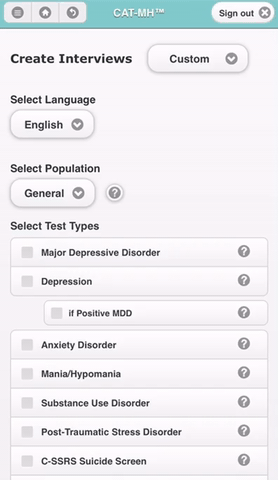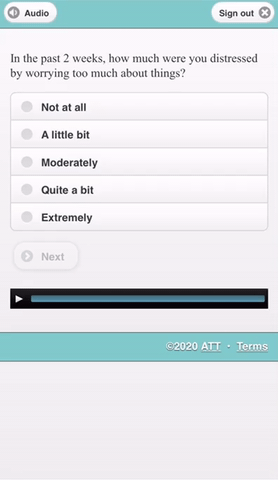The CAT-MH® is a suite of measures validated for depression, anxiety, mania/hypomania, substance use disorder, psychosis, PTSD, social determinants of health, adult ADHD, and suicidality.
REQUEST A DEMOFeatures of the CAT-MH®
The CAT-MH® is a distinct suite of computer adaptive tests (CAT) that represents a fundamental scientific breakthrough in psychopathology screening and measurement based on self-reported ratings of the patient.
VALIDATED
The CAT-MH® has been validated against structured clinical diagnostic interviews (SCID-DSM-5) and published in top-tier peer-reviewed journals such as JAMA Psychiatry.
LARGE ITEM BANK
The CAT-MH® adaptively selects a small optimal set of items from a large bank of approximately 1,500 items, targeted to each person’s current or historical level of severity.
PRECISE MEASUREMENT
Instead of fixing the items and allowing the precision of measurement to vary, we fix the precision of measurement and allow the items to vary. The result is a dramatic increase in the precision of measurement with the same and in some cases even lower burden of measurement for the patient and the complete elimination of clinician burden.
QUICK ADMINISTRATION
In an average of 2 minutes per module, patients can be screened for anxiety, depression, substance use disorder, psychosis, suicidality, PTSD, social determinants of health, adult ADHD, and mania/hypomania, with precision equal to what would have taken hours to achieve with traditional fixed length tests. This process can be further streamlined by integrating with our API.
CLOUD-BASED
The CAT-MH® is cloud-based and scalable to any size population via a HIPAA secure Amazon Web Services (AWS) platform, meaning patients can be screened, measured, and monitored in or out of the clinic.
LANGUAGES
The CAT-MH® is available in English, Spanish, and Chinese, and has built-in selectable audio to aid in literacy issues and further ease of use. The text is at a seventh grade reading level.
AVAILABLE VIA API
The CAT-MH® can be leveraged via API (application programming interface) for integration into Electronic Health Records. We have fully integrated our tools into the Epic EHR at the University of Chicago and developed clinical workflows designed around the integration.
INTEGRATION SOLUTIONSREMOTE-FRIENDLY
The CAT-MH® is cloud-based and can be administered on any internet-capable device (smartphone, tablet, notebook, or computer). Our tools are scalable to any size population via a HIPAA secure Amazon Web Services (AWS) platform.
What does the CAT-MH® measure?
The CAT-MH® is a suite of measures validated for depression, anxiety, mania/hypomania, substance use disorder, psychosis, PTSD, social determinants of health, adult ADHD, and suicidality. Our browser-based clinician portal makes it simple to create a custom selection of test types and notification settings to meet your organization’s needs.
CAT-MH MODULES
How does the CAT-MH® work?
The CAT-MH® is based on multidimensional item response theory (MIRT). Within computer adaptive testing (CAT), individuals’ initial item responses are used to determine a provisional estimate of their standing on the measured trait to be used for subsequent item selection. Item Response Theory (IRT) is a statistical theory and related methodology that relates a series of item responses (binary, ordinal, or nominal) to one or more latent variables (e.g. depression).
For a more complete discussion of the fundamentals in IRT, you may read Item Response Theory written by pioneers in the field.
Multidimensional Item Response Theory
Based on MIRT procedures, estimates of items (e.g., difficulty, discrimination) and individuals (e.g., severity of depression) can be obtained to more efficiently identify suitable item subsets for each individual. MIRT weighs more severe items more heavily than less severe items in deriving a test score. MIRT also provides an estimate of uncertainty that can be used to assess the significance of change.
Our exclusive use of MIRT-based CAT enables us for the first time to provide adaptive measurement of complex disorders such as depression, SUD, and suicidality. There are no other behavioral health measurement systems that use this advanced psychometric technology. It is essential for scientifically rigorous measurement of behavioral health constructs.


